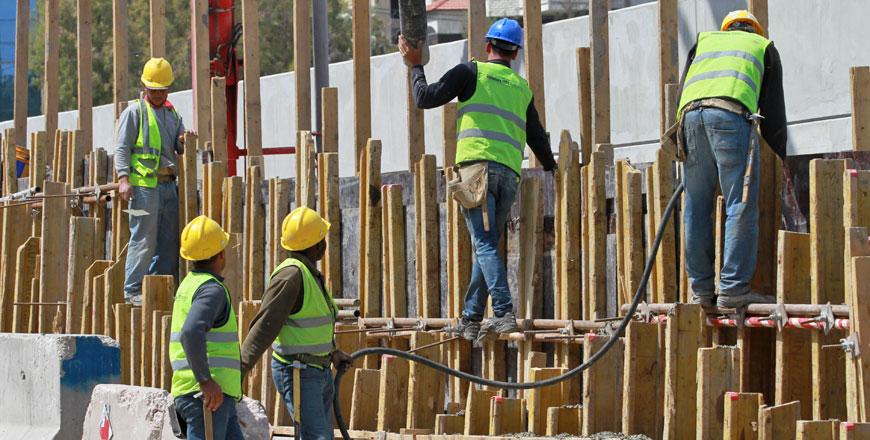You are here
Team formed to overhaul expatriate labour regulations
By Ana V. Ibáñez Prieto - Nov 01,2018 - Last updated at Nov 01,2018
AMMAN — The Ministry of Labour and the Jordanian Construction Contractors Association (JCCA) on Tuesday agreed to form a working team aimed at establishing new foundations for the regulation of expatriate labour in the sector.
The decision came during a meeting held at the headquarters of the union, where Labour Minister Samir Murad met with JCCA President Ahmad Yacoub in the presence of the ministry’s Secretary General Hani Khleifat and several members of the union.
Addressing the JCCA members present at the meeting, Murad stressed the need for “joint efforts between the union and the ministry in order to overcome the difficulties facing the local labour market”, thanking JCCA for their “strategic partnership in regulating the labour market in one of the most important sectors for the Jordanian economy”.
The minister also pointed out the need to “further expand the local labour market and take into account the interests of Jordanian workers”, stressing the importance of “investing in Jordanian talent in order to reduce poverty and unemployment rates”.
In terms of expatriate labour, Yacoub called to open the door to more migrant workers from Asian countries, estimating that the entry of Asian labourers would reduce the median wage paid to expatriate workers by 50 per cent.
In this regard, the official noted that the current median income of expatriate workers in Jordan stands at around JD1,000 per month, stressing that “this is higher than the median income of a Jordanian engineer with 3-5 years of experience”.
Director General of the union Tareq Harini, pointed out that the “huge rise” in the wages of expatriate workers has led to restrictions on contractor’s, echoing Yacoub’s call to open the door for more workers.
“Hiring more Asian workers would reflect positively in the overall cost of projects and thus revitalise the sector,” he said.
Commenting on the remarks, Jordan Labour Watch (JLW) Director Ahmad Awad told The Jordan Times that “the union’s plan to bring in Asian workers in order to reduce the median wage for expatriate workers would straightforward eliminate any opportunities available for the employment of Jordanians in this sector”.
“If there is a push to create unfair competition, that will trigger a reduction not only in the workers’ wages but in their employment conditions,” the expert added.
According to a regional report issued by the Business and Human Rights Resource Centre earlier this year, the construction sector in the Kingdom is still relying “heavily” on informal migrant workers and Syrian refugees, warning that most workers in the sector are subject to exploitation by their employers due to their “fragile” legal status.
In terms of refugee labour, over 16,000 flexible working permits for Syrian refugees employed in the construction sector were issued over the past year, the Ministry of Labour announced during a workshop organised by the International Labour Organisation (ILO) in September.
The newly issued permits came after an agreement signed by the Labour Ministry, the General Federation of Trade Unions and the ILO in late August 2017, which sought to organise the work of Syrian refugees in the construction sector in Jordan through the issuance of work permits, which allow employees to move from one employer to another.
The report, titled “Understanding Risks to Construction Workers in the Middle East”, pointed out that the top three countries of origin for registered migrant workers in Jordan were Egypt; with 170,000 workers, Bangladesh; with 50,574 registered employees and Syria; with 33,485 workers.
“But these figures do not reflect the full reality that exists on the ground,” the study claimed, adding that from a total of 1.2 million foreign labourers present in the Kingdom, only 315,000 held official work permits.
“All these employees fall outside the legitimate employment structures and suffer from the lack of application of the Labour Code,” the study warned, stressing that, although the provisions of the Jordanian Labour Law shall protect all workers regardless of their nationality or legal status, they are “not really applied on the ground”.
“The current model used for the issuance of work permits in Jordan requires the employee to commit to work for a specific employer — which increases the vulnerability of their social and economic status due to the instability of the construction sector,” Awad commented, calling for changes in the current model so as to allow foreign employees to work with any employer they wish to.
Related Articles
AMMAN – Minister of Labour Ali Ghezawi on Sunday met with Jordanian Construction Contractors Association (JCCA) President Wael Toukan and it
AMMAN — Jordanian Construction Contractors Association (JCCA) Deputy President Ahmad Yacoub has called on the government to pay the contract
AMMAN — Over 16,000 flexible working permits for Syrian refugees employed in the construction sector have been issued over the past year, th












